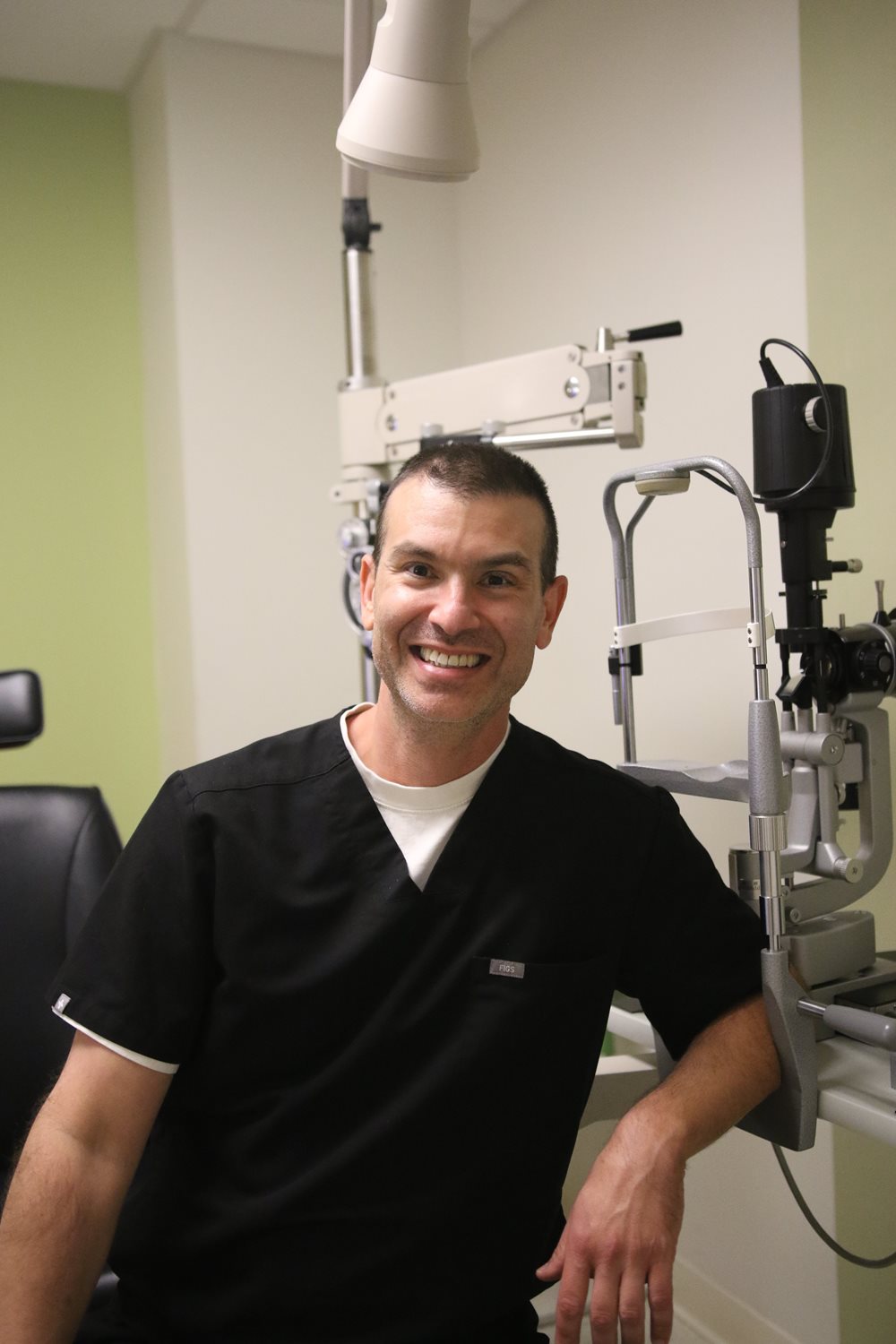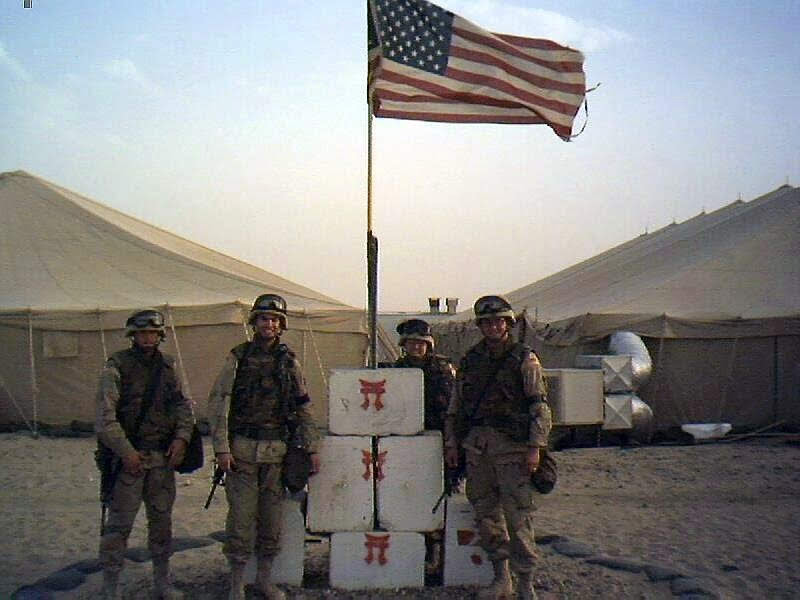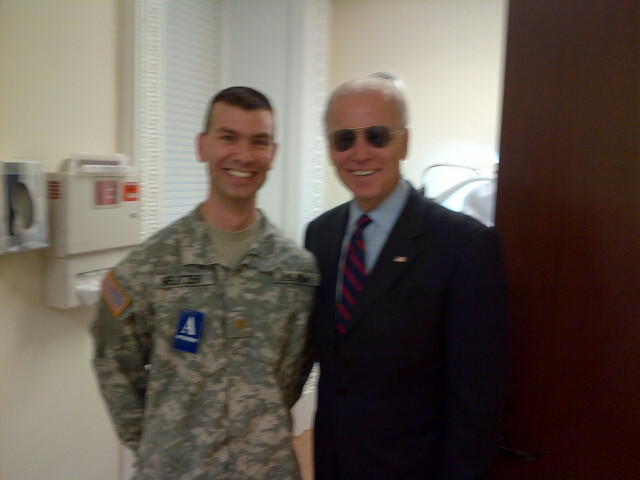Faculty Focus: Dr. David Meltzer
 Within a year after graduating from the Pennsylvania College of Optometry (PCO), David Meltzer, OD, FAAO found himself in Iraq as part of the First Armored Division, embedded with the 47th Forward Support Battalion stationed at the Baghdad Airport during Operation Iraqi Freedom.
Within a year after graduating from the Pennsylvania College of Optometry (PCO), David Meltzer, OD, FAAO found himself in Iraq as part of the First Armored Division, embedded with the 47th Forward Support Battalion stationed at the Baghdad Airport during Operation Iraqi Freedom.
Dr. Meltzer, a captain in the U.S. Army, was one of 10 U.S. eye doctors stationed in Iraq at the time, responsible for treating U.S. soldiers, civilians that had been injured and prisoners of war captured by the Americans. The war in Iraq had taken a positive turn for the U.S. Saddam Hussein’s government had fallen and the Americans had taken control of the situation.
Dr. Meltzer was laying in his cot on a Sunday morning when there was a knock at his door. It was a doctor from the detention facility near the Baghdad Airport.
“He said, ‘I have a patient and I can’t tell you his name. But you’re going to want to see him. He’s not going to come here, so you have to go to him,’” recalled Dr. Meltzer.
Within a week, Dr. Meltzer, along with a technician, took the five-minute drive to the detention facility, where they were scheduled to see a group of prisoners. At one point, they were led down a long hall to an area that housed only one prisoner. Dr. Meltzer was to conduct an eye exam on the prisoner in the hallway outside his cell.
And, out of the cell stepped The “Butcher of Baghdad” himself, Saddam Hussein, who had been captured just days earlier. “And, oh my God, there he was. When he was caught, he had the gray beard and the gray hair. That’s what he looked like, just like the video when he was caught. He was older, he looked tired and he knew he was defeated,” said Dr. Meltzer.
According to Dr. Meltzer, who received information from an FBI agent guarding Saddam, the former Iraqi dictator knew English, but didn’t speak it to anyone he didn’t know.
“He didn’t say much of anything, even to the interpreter. What my tech was doing was actually pointing to the letters on an eye chart and he would read the letters and the interpreter would tell me what he was saying,” said Dr. Meltzer.
The exam was fairly routine. Saddam had a little bit of diabetic retinopathy, Dr. Meltzer said, and his vision was 20-25. Dr. Meltzer prescribed him glasses.
“I still have a copy of the prescription. It was HVD (High Valued Detainee) 1001,” said Dr. Meltzer.
When the exam was completed, Saddam shook hands with Dr. Meltzer and said “Thank you,” the only English he would speak to the American optometrist.
 Saddam wasn’t the only high-profile patient Dr. Meltzer treated during his time in Iraq. He also performed eye exams at different times on Ali Hassan al-Majid, military commander under Saddam, dubbed “Chemical Ali” for his use of chemical weapons against the Kurdish people; and Tariq Aziz, Saddam’s deputy prime minister and close advisor.
Saddam wasn’t the only high-profile patient Dr. Meltzer treated during his time in Iraq. He also performed eye exams at different times on Ali Hassan al-Majid, military commander under Saddam, dubbed “Chemical Ali” for his use of chemical weapons against the Kurdish people; and Tariq Aziz, Saddam’s deputy prime minister and close advisor.
“That shows the professionalism of the United States military compared to terrorist organizations. As a professional, as a U.S. soldier, we have to lead by example and set the bar high,” said Dr. Meltzer about the humanitarian medical efforts afforded the POWs by the U.S.
After his service in Iraq, Dr. Meltzer was stationed in Germany and Italy before returning to the states to complete a residency in San Antonio, Texas. By 2008, he was stationed at Walter Reed National Military Medical Center in Bethesda, Maryland.
But his treatment of high-profile patients didn’t end in Iraq. While at Walter Reed one day, he got a call from the chief of his clinical site, who was on vacation at the time. “He said, ‘Can you go to the White House? I need you to see the vice president,’” said Dr. Meltzer. “I canceled the rest of my patients that day and went to the White House.”
The head doctor at the White House met Dr. Meltzer at the front gate and escorted him into the in-house medical clinic, which is housed in the Eisenhower Executive Suite attached to the White House.
“I was sitting there for a few minutes and in walks Vice President (now President) Joe Biden,” said Dr. Meltzer. “It was so cool. Political affiliations aside, he was such a nice, friendly guy. Some people might be afraid to ask for a picture, but he was like, ‘You want to take a picture?’”
 Dr. Meltzer retired from the military on March 31, 2019. Prior to that, he had hosted externs from PCO while in the military and while attending the PCO/Salus externship expo in 2018, he was still trying to figure out what career path to take after his retirement. It was at that expo where a conversation withSatya Verma, OD, FAAO, DPNAP, Diplomate, the externship coordinator for PCO/Salus, helped Dr. Meltzer decide on his next career move.
Dr. Meltzer retired from the military on March 31, 2019. Prior to that, he had hosted externs from PCO while in the military and while attending the PCO/Salus externship expo in 2018, he was still trying to figure out what career path to take after his retirement. It was at that expo where a conversation withSatya Verma, OD, FAAO, DPNAP, Diplomate, the externship coordinator for PCO/Salus, helped Dr. Meltzer decide on his next career move.
“He asked me when I was going to retire and did I have any jobs lined up,” said Dr. Meltzer. “I knew when my retirement date was and I knew I was coming back to Philadelphia, partly because of my love for Philadelphia sports.”
So, Dr. Meltzer approached Melissa Trego, OD, PhD, dean of PCO, about a potential job and on Jan. 8, 2019, Dr. Meltzer, joined the PCO/Salus faculty as an assistant professor and clinical instructor.
“I think it’s awesome how I’ve come full circle,” he said. “One thing I loved about the military is meeting all the different people and talking to my patients. And, that’s one of the things I love about PCO — you’re meeting and working with different doctors and students from all over the world and there’s a great diversity of patients. I couldn’t ask for anything more.”